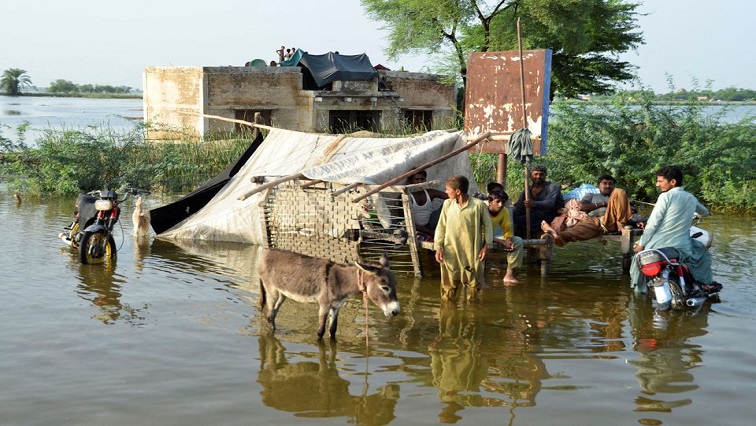In the midst of total devastation from unprecedented severe floods that have ravaged Pakistan, killing almost 1 700 people – more than 500 of those being children – and leaving more than 20 million in need of humanitarian assistance, the country is facing yet another calamity.
According to the World Health Organisation (WHO), the country has seen a rise in cases of malaria, dengue fever, acute water diarrhea, and skin diseases among the 33 million people affected by the deluge.
The world health body says the situation is expected to worsen with an expectation of 2.7 million malaria cases in 32 districts by January 2023.
This crisis emanates from the four-month-long severe floods that have hit Pakistan, in what authorities say is because of climate change which has led to global warming.
A supersized price for manmade climate change…
During the General Assembly on Pakistan floods earlier this month, United Nations (UN) Secretary-General, Antonio Guterres, told a plenary meeting that while Pakistan was responsible for 1% of the global greenhouse gas emissions, the country was paying “a supersized price for manmade climate change”.
“One month ago, I traveled there and saw a level of climate carnage beyond imagination: flood waters covering a landmass three times the total area of my own country, Portugal. Many have lost everything – their homes, their livestock, their crops, their futures. Lives were washed away. The most vulnerable of the vulnerable – children – accounted for fully one-third of all deaths and injuries,” lamented Guterres, warning the situation was worsening.
“Pakistan is on the verge of a public health disaster. The risk of a cholera outbreak, malaria and dengue fever threaten to claim far more lives than the floods,” he added.
The UN describes climate change as long-term shifts in temperatures and weather patterns, which may either be natural, such as through variations in the solar cycle or by human activities consequent to burning fossil fuels like coal, oil, and gas, as it has been the case since the 19th century.
“Burning fossil fuels generates greenhouse gas emissions that act like a blanket wrapped around the earth, trapping the sun’s heat and raising temperatures,” states the UN.
Global average surface temperature, according to the UN’s Intergovernmental Panel on Climate Change (IPCC) increased by 1.09 °C between 1850 and 2020 and is set to increase even more if no interventions are implemented, putting in jeopardy the health of millions of people around the world.
The UN says increased sea surface temperatures as a result of what it terms the albedo effect – less permanent ice in polar regions and high-altitude glaciers – have meant stronger storms generated across the oceans, which have brought devastation and infrastructure challenges following from these.
Health impact already devastating
The health impact of these changes in the climate, according to the IPCC, is already devastating.
The IPCC’s fifth Assessment Report (AR5) states that changes to the hydrological cycle – the continuous circulation of water in the earth-atmosphere system – have impacted food and energy production and increased the incidence of water-borne diseases.
“Climate-induced trends and extremes in the water cycle have impacted agricultural production positively and negatively, with negative impacts outweighing the positive ones,” reads the report in part.
It states that there is an increase in climate-related food safety risks which include infections “associated with cancer and stunting in children and seafood contamination with marine toxins and pathogens.”
According to the UN, between 2030 and 2050 there could be 250 000 deaths per year because of climate change.
“Mortality and morbidity will escalate with further global warming, placing additional strain on health and economic systems. At 1.5°C of global warming, distribution and seasonal transmission of vector-borne diseases is expected to increase, exposing tens of millions more people, mostly in east and southern Africa. Above 1.5°C global warming the risk of heat-related deaths rises sharply, with at least 15 additional deaths per 100 000 annually across large parts of Africa,” says the report.
Vector-borne diseases are infections transmitted by the bite of infected arthropod species, such as mosquitoes.
Complex consequences…
However, the consequences of climate change and the resultant global warming may not unfold in a linear and predictable manner because of the earth’s systems, according to Auwal Socio-Economic Research Institute (ASRI) Director of Research, Angelo Fick.
He says the COVID-19 pandemic has demonstrated that global cooperation in crisis is much harder to achieve, which could exacerbate the impact of climate change.
“The further impact on health will not only result from the extreme heat of summer temperatures. The increased failures of crops, because of new weather patterns and a much more hostile climate regime from the one in which agriculture arose over the last 8 000 years, will result in malnutrition and starvation for millions. The political instability consequent to food insecurity will lead to greater numbers of people migrating, and this will not only bring about new conflicts, but also potentially new disease outbreaks as large populations move in unsanitary conditions,” says Fick.
An IPCC sixth Assessment Report fact sheet states, “Under 1.7°C global warming, reduced fish harvests could leave 1.2–70 million people in Africa vulnerable to iron deficiencies, up to 188 million for vitamin A deficiencies, and 285 million for vitamin B12 and omega-3 fatty acids by mid-century.”
Over and above issues of malnutrition, infections and disease that are anticipated owing to climate change, “mental health challenges increase with warming temperatures, trauma associated with extreme weather and loss of livelihoods and culture,” according to the IPCC sixth assessment report.


